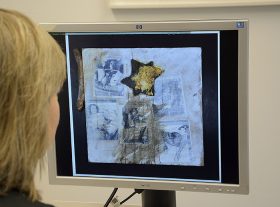
Nina Wilkens contemplating the collage “Found objects on flat cardboard box” on her computer screen; Jewish Museum Berlin, photo: Svenja Kutscher
Five black and white photographs of a scantily-clad woman, legs spread open, in various suggestive poses. The pictures smudged and stuck askew onto white cardboard. On top, a Star of David partly smeared with yellow paint. A brown dildo is fastened next to the cardboard. This constellation of things looks at first glance like useless trash. Objects left on the ground, covered with their share of grime, and now lying here piled on top of one another. This work by Boris Lurie from our current exhibition “No Compromises! The Art of Boris Lurie” (further information about the exhibition on our website) has no name and its date is ambiguous.
When I started thinking, around a year ago, about a pedagogical program on Boris Lurie, I got stuck on this picture as I sat at my computer clicking through images of the works that were being considered for the exhibit. I was confused by my own reaction to this collage of two- and three-dimensional objects: vacillating between disgust and uncertainty. I had the words “obscene” and “tasteless” on the tip of my tongue but found them unsuitable. The image hurt. I wondered how students would react to Boris Lurie’s art. → continue reading
The Jewish Museum Hosts “Lyrix”
 At the invitation of German Cultural Radio, schoolchildren appeared at the Jewish Museum Berlin on 13 June 2014 to write poetry with professionals from the literature scene. The theme was partnership. They turned for inspiration to a ketubah (marriage contract) from the current special exhibition “The Creation of the World” and the poem “marriage” by Kathrin Schmidt (which you can see in the original German on the Lyrix page of the radio’s website).
At the invitation of German Cultural Radio, schoolchildren appeared at the Jewish Museum Berlin on 13 June 2014 to write poetry with professionals from the literature scene. The theme was partnership. They turned for inspiration to a ketubah (marriage contract) from the current special exhibition “The Creation of the World” and the poem “marriage” by Kathrin Schmidt (which you can see in the original German on the Lyrix page of the radio’s website).
Poet Max Czollek guided the students, gathered in a seminar room, to free associate with the term ‘partnership.’ Words came up like marriage, devotion, trust and love (both very frequently), loyalty, and so on. But those most obvious associations aren’t actually what we need for poetry. What do we need then?
A few rooms further down, poet Nadja Küchenmeister proceeded along the same lines. One pupil said later that dividing the words into categories of ones she shouldn’t use and ones she should helped ease her fear about writing. She produced the following poem: → continue reading
During the week of October 21 to 27, 2013 the Academy of the Jewish Museum Berlin, in cooperation with Kulturkind e.V., will host readings, workshops, and an open day for the public with the theme “Multifaceted: a book week on diversity in children’s and young adult literature.” Employees of various departments have been vigorously reading, discussing, and preparing a selection of books for the occasion. Some of these books have already been introduced here over the course of the last weeks.

At a first glance, Janne Teller’s book looks like a passport – it’s just that small and, with just 32 pages, not much thicker. The text begins with a question: “If a war were to break out here. Where would you go?” I had never asked myself this question before. And yet, with her simple but poignant sentences Teller paints a powerful picture of a war in Germany, the flight of a family through a number of countries and their subsequent life in a refugee camp, as well as telling the story of a new generation growing up in Egypt. → continue reading


